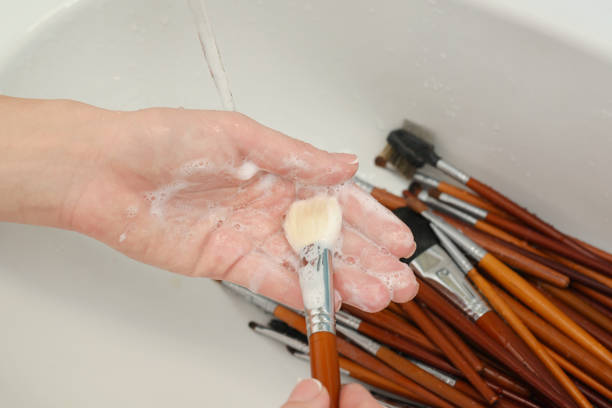As more consumers prioritize eco-consciousness in their purchasing decisions, permanent makeup artists and manufacturers are exploring sustainable alternatives to traditional practices.
In this article, we delve into the sustainable practices shaping the future of the permanent makeup industry and the steps being taken to minimize environmental impact.
The Need for Sustainability in Permanent Makeup
Permanent makeup, also known as micro-pigmentation, involves the implantation of pigments into the skin to enhance features such as eyebrows, lips, and eyeliner.
While the procedure offers convenience and long-lasting results, traditional practices have raised concerns about environmental sustainability. The use of synthetic pigments, disposable tools, and non-biodegradable packaging contributes to waste accumulation and environmental pollution.
Recognizing the need for change, permanent makeup artists, manufacturers, and consumers are championing sustainable practices that prioritize environmental responsibility without compromising on quality or safety. By embracing eco-friendly alternatives and innovative solutions, the industry is paving the way for a more sustainable future.
Eco-Friendly Pigments
One of the most significant strides in sustainable permanent makeup practices is the development of eco-friendly pigments. Traditionally, permanent makeup pigments contain synthetic ingredients and heavy metals that pose risks to both human health and the environment.
However, advancements in pigment technology have led to the creation of natural and organic pigments derived from plant-based sources.
These eco-friendly pigments offer vibrant color payoff without the need for harmful additives, making them safer for both clients and artists. Additionally, manufacturers are prioritizing sustainable sourcing and production methods to minimize environmental impact throughout the supply chain. By opting for eco-friendly pigments, permanent makeup artists can achieve beautiful results while reducing their carbon footprint.
Biodegradable Tools and Packaging
Disposable tools and single-use packaging have long been standard practices in the permanent makeup industry. However, the environmental consequences of these practices, such as plastic pollution and waste accumulation, have prompted a shift towards biodegradable alternatives.
Biodegradable tools, made from materials such as bamboo or compostable plastics, offer a sustainable alternative to traditional disposable implements. These tools break down naturally over time, reducing the environmental impact of the permanent makeup process.
Similarly, biodegradable packaging options, such as recycled paper or plant-based plastics, help minimize waste and promote eco-conscious consumer choices.
Sustainable Studio Practices
Beyond product choices, permanent makeup studios are adopting sustainable practices to minimize their environmental footprint. From energy-efficient lighting and water-saving fixtures to recycling programs and eco-friendly cleaning products, studios are implementing measures to reduce resource consumption and waste generation.
Additionally, some studios are embracing digital technologies, such as electronic consent forms and online consultations, to minimize paper usage and streamline administrative processes.
By prioritizing sustainability in studio operations, permanent makeup artists can contribute to the broader effort toward environmental stewardship while providing quality services to their clients.
Education and Awareness
As sustainability becomes increasingly important in the permanent makeup industry, education and awareness play a crucial role in driving change. Permanent makeup artists are seeking out training programs and workshops that emphasize sustainable practices and eco-friendly techniques.
Likewise, consumers are becoming more discerning about the products and practices used in permanent makeup procedures, prioritizing studios and artists that prioritize sustainability.
By raising awareness about the environmental impact of traditional practices and showcasing the benefits of sustainable alternatives, the industry can inspire widespread adoption of eco-conscious approaches.
Conclusion
The permanent makeup industry is undergoing a transformative shift towards sustainability, driven by a commitment to environmental responsibility and consumer demand for eco-friendly options. From eco-friendly pigments to biodegradable tools and packaging, sustainable practices are shaping the future of permanent makeup, offering a greener approach to beauty enhancement. As permanent makeup artists, manufacturers, and consumers embrace sustainable alternatives, they are not only reducing their environmental footprint but also contributing to a more ethical and socially responsible industry.
FAQs
Q1: Are eco-friendly pigments as long-lasting as traditional synthetic pigments?
Eco-friendly pigments are formulated to offer comparable longevity and color retention to traditional synthetic pigments. However, individual results may vary depending on factors such as skin type, aftercare practices, and the skill of the permanent makeup artist.
Q2: Are biodegradable tools and packaging more expensive than traditional options?
While biodegradable tools and packaging may have a slightly higher upfront cost, many artists and studios find that the environmental benefits outweigh the additional expense. Additionally, as demand for sustainable options grows, prices may become more competitive over time.
Q3: Can I request sustainable practices at my permanent makeup studio?
Yes, many permanent makeup studios offer sustainable options for clients who prioritize environmental responsibility. When scheduling your appointment or consultation, inquire about the studio’s sustainability initiatives and express your preference for eco-friendly products and practices.
Q4: How can I dispose of biodegradable tools and packaging responsibly?
Biodegradable tools and packaging can be disposed of in compost bins or facilities that accept biodegradable waste. Be sure to check local regulations and guidelines for proper disposal methods in your area.
Q5: Are there certifications or standards for sustainable permanent makeup products?
While there are currently no industry-wide certifications specifically for sustainable permanent makeup products, many manufacturers adhere to third-party certifications for organic, cruelty-free, and eco-friendly products. Look for products that are certified by reputable organizations or inquire about the manufacturer’s sustainability practices.



